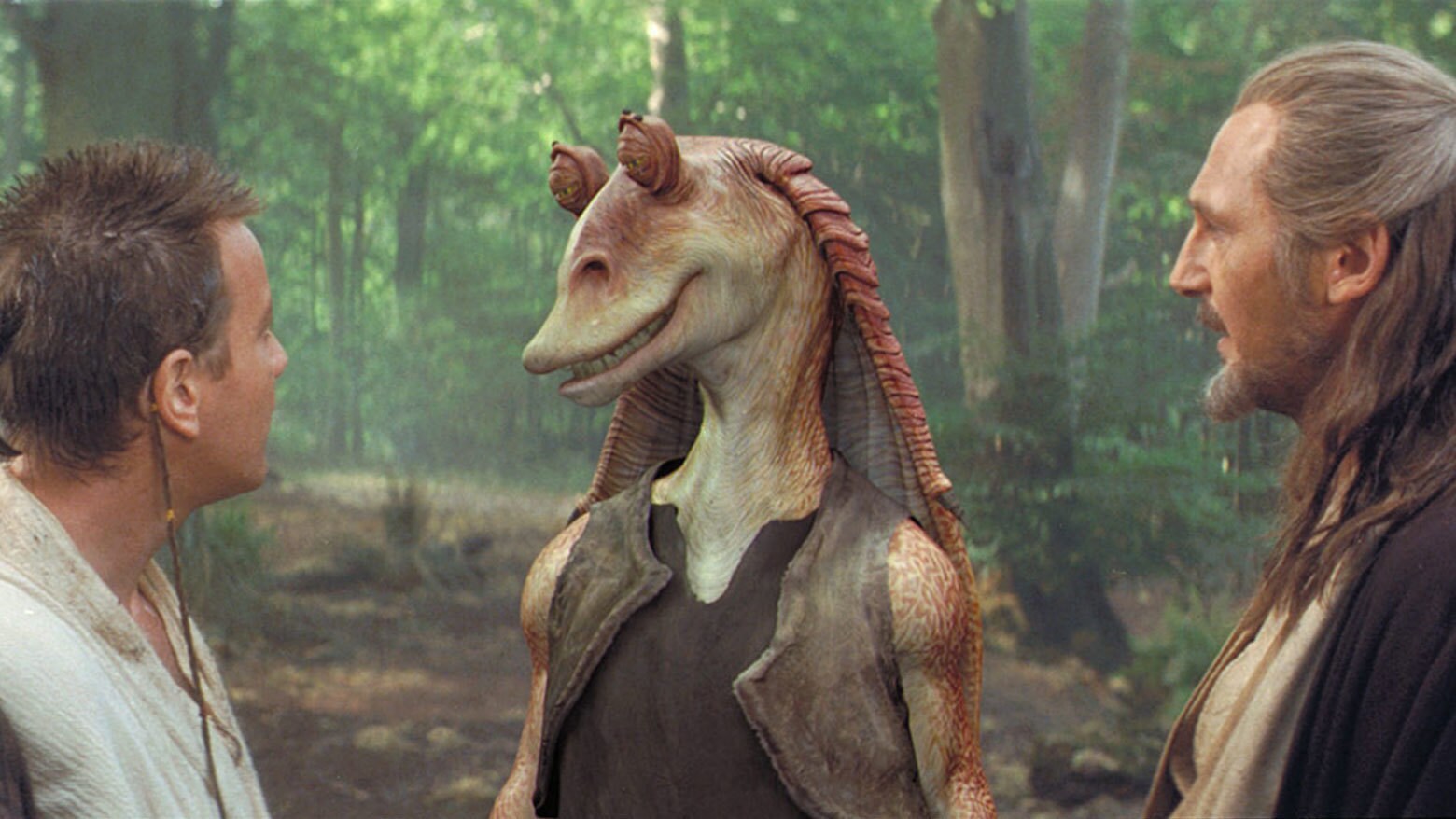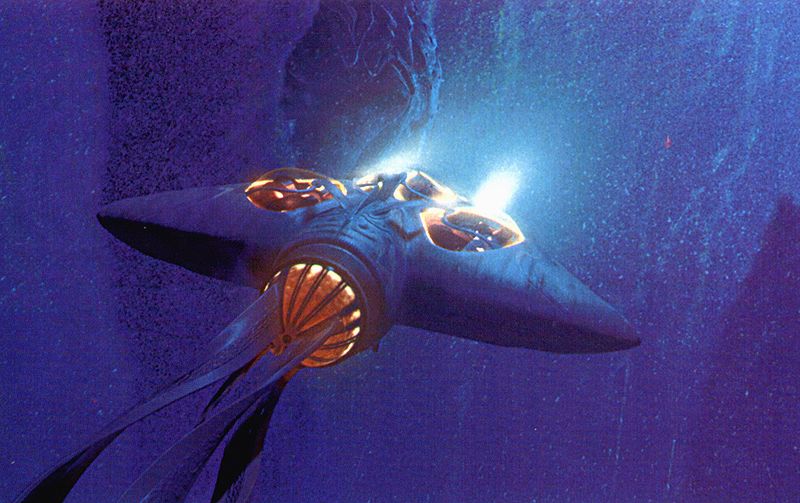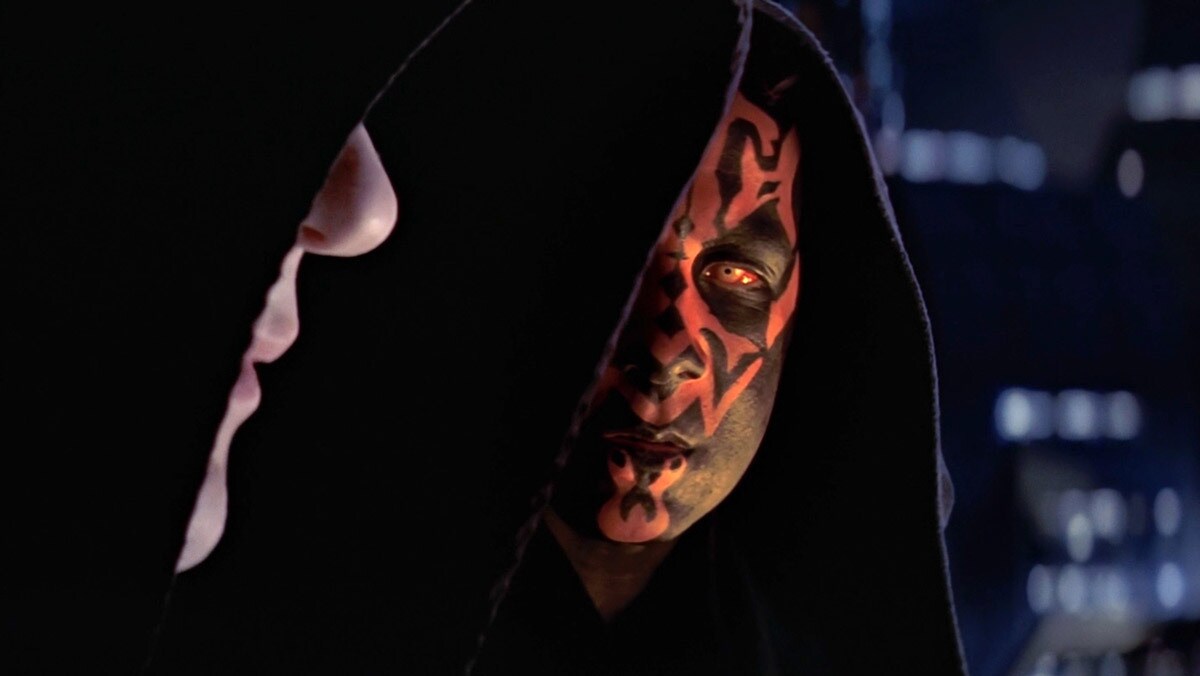The opening scenario of Star Wars is a negotiation. Or the attempt of one, at any rate. The Trade Federation has gotten into a trade dispute with the rich and fertile planet of Naboo and has blockaded them. Apparently this isn't an uncommon thing, because Qui-Gon doesn't seem all that concerned that a planet is being blockaded for not paying its bills. This is normal. And all of this comes off as... unusual... to us viewers, doesn't it? Well, it should. It's going from right to left. Every time the Jedi are actually moving, trying to figure things out, it's shot at an awkward angle, the classical "bad" shot. Oh, and the Trade Federation is generally shot at this angle as well. Something's up. The good guys aren't actually doing anything helpful (playing by a broken system) and the Trade Federation isn't either.
The first indication to me that something is weird is Qui Gon telling Obi-Wan to go onto another vessel and not for reasons that most people would think. It didn't bother me because it seemed stupid, it bothered me because the decision seemed familiar. Years later I would learn that Qui Gon is an ENFP (of which I happen to be one), and he made a lot of sense all of a sudden. Qui Gon is not the person who has a plan so much as he reads a situation and makes a snap decision, logic be damned. I know this because I do it all the time. Reading the signs of my life the way a shaman reads bones I jump, often with no rational thought beyond a gut feeling that right then and there a certain reaction is necessary, even if it drives my poor INTJ wife up the bloody wall. And Qui Gon, who is apparently an ENFP, does much the same thing. He takes a quick look and then jumps, figuring that it'll sort itself out later.
 |
| I cannot begin to tell you how realistic this situation is for an ENFP. Don't laugh. You may be some poor ENFP's Jar Jar Binks and not know it. |
It's here, again, where we watch an ENFP in his element: in the middle of absolute chaos that he feels is NOT. With the knowledge that Qui Gon is an ENFP it's actually funny to watch him just cruise through the ensuing chaos, trying not to get annoyed at Jar Jar. None of the big and scary things are very frightening to him simply because, in his mind, it's all a part of the plan that he's discovering, one step at a time. Many is the time that you'll find an ENFP doing things that no one in their right mind would even consider doing (like going through the planet core) simply because it seemed like a good idea at the time, conscious thinking be damned to the trap-inducing hell it belongs.
Of course this line of thinking winds him up with a Queen on a damaged ship stranded on Tatooine. So, he sets out with someone he knows is actually the Queen (yeah, he picks up on that), poking at her that her ideas are bad and that his are good and he's not impressed with a 14 year old girl's ideas on how to do much of anything. Does she pick up on this? It's unknown. If she does she doesn't let on.
It's here we meet Anakin Skywalker, a lonely slave boy who, despite the abuse of Watto, still has some compassion in him. I think. It's hard to tell, actually, if Anakin is compassionate or has a god-complex. And who can blame him? He built a friggin' droid at the age of nine and can race pods. At nine. Most people I know think Anakin is annoying, but a few good home videos embarrass them by similarity so badly it's hilarious. Art is a very finely constructed mirror, and Lucas's mirror is constructed to remind us that no, we're really not all that special. Even if we are gifted in some areas we're probably annoying to teach us some humility. A good rule of thumb from the Eastern Christian Fathers is this: if something about a person annoys you it's because you possess the same flaw but it's hidden, and therefore you should probably thank the annoying person for cluing you into yourself.
I don't know a person alive that Anakin doesn't annoy on a personal level.
Regardless of Anakin's potential for hubris even at this age (I mean, he dreams about saving the slaves for criminy's sake), Qui Gon, not thinking but feeling, puts his trust in him because he's the only puzzle piece that can complete the picture of them getting off this horrible planet. Turns out he's right to do so.
Last, but definitely not least, is Queen Padme Amidala. An elected monarch of the tender age of 14, Padme has all the idealism of a child, right along with her planet. With a blockade starving her people to death and communications cut Padme still wants to negotiate, a move so patently naive that her own advisers correct her. She decides to go to onto Tatooine, despite Qui Gon's issues. Why on earth would she do this? There's no explanation given, but I wonder if it's because she's disillusioned with her decision to rely on negotiations. Being a ruler is a lot of responsibility, no matter your age, and at 14 it's going to be crushing. I'd wanna get off the ship too and clear my head. It's here she meets Anakin, a slave who has much potential, so much promise, like herself. And yet, when faced with trusting another young person besides herself, someone she's clearly interested in (even if not romantically), she backs away. What does that say about Padme and what she thinks of herself? Probably nothing very good, although she doesn't voice it. I mean, she's only a few years older than Anakin and look how that turned out! Why should she trust him when she really can't even trust to show her own true self for most of the movie? Fortunately Anakin succeeds. In amazement Padme says that Anakin saved them all. Maybe there's some hope for Naboo through her after all. I mean, if a nine year old boy can do the impossible maybe she can too. Padme owes Anakin a great deal and finds herself caring for him because, in a way, it means caring for herself. But all of this is said from the right. Even here, trouble is hinted at. She can't tell the truth about who she is and it all ends up hollow. It's an ominous end to the first act.
Before we wrap up we need to go to what Sidious and Maul are up to. It's important to note the colors they wear, because this tells us a lot about them. Black is the color of purpose, and they're shown from right to left and left to right, up in the heavens and shadows of Coruscant, plotting. Considering that the Jedi are all naive and earthy (whites with browns) this tells us a few things. The Sith are not mindlessly angry; they have a plan, and it's one of revenge. We find out later that the Sith used to rule the galaxy and things were what they call peaceful. That's something to discuss more when we get to Revenge of the Sith, but it's important to remember that we are the myth. While the overworlds of our minds may be aimless and dumb at times that's something you can never, ever, ever, attribute to the Shadow in us. Our Shadow has been hurt over a period of many, many years, and has gotten quite could at thinking in the midst of the awful pains that we've put into it in an attempt to not look crazy in our insane pride and vanity. So the Shadow goes crazy for the Overworld, concealing the hurts and pains. But eventually everybody's Shadow has had enough and, using any slight pretext to begin moving, craftily makes plans to take over, simply so that it won't be forced to hurt again.
 At last it will have revenge upon the Ego, the Overworld. At last the Shadow, the Underworld, will go after the one that isn't actually there to save the enslaved, but only goes through the Underworld by accident, hoping to leave as soon as possible. At last the Underworld will say: "I'm here, I'm powerful, I've been ignored, and I'm pissed off." When that day comes no one is unafraid, because it's never in our plans to have the Underworld show up. And when it does we both size each other up, draw swords, and try to put an end to each other as fast as we can...
At last it will have revenge upon the Ego, the Overworld. At last the Shadow, the Underworld, will go after the one that isn't actually there to save the enslaved, but only goes through the Underworld by accident, hoping to leave as soon as possible. At last the Underworld will say: "I'm here, I'm powerful, I've been ignored, and I'm pissed off." When that day comes no one is unafraid, because it's never in our plans to have the Underworld show up. And when it does we both size each other up, draw swords, and try to put an end to each other as fast as we can...It's a mess. That very well may be what suicide is.


/jake-lloyd-56a8f97b5f9b58b7d0f6df96.jpg)


No comments:
Post a Comment